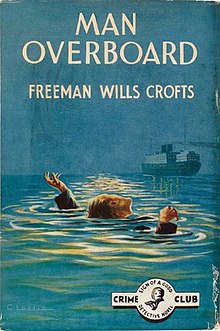
Freeman Wills Crofts FRSA was an Irish engineer and mystery author, remembered best for the character of Inspector Joseph French.
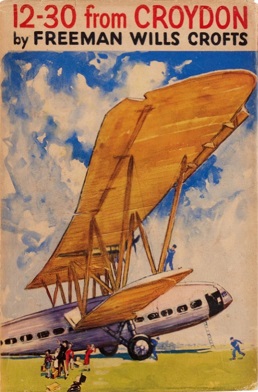
The 12.30 from Croydon is a detective novel by Freeman Wills Crofts first published in 1934. It is about a murder which is committed during a flight over the English Channel. The identity of the killer is revealed quite early in the book, and the reader can watch the preparations for the crime and how the murderer tries to cover up his tracks. The final chapters of the novel are set in a courtroom and during a private function at a hotel, where a résumé of the whole case is given in front of a small group of police detectives, solicitors, and barristers.
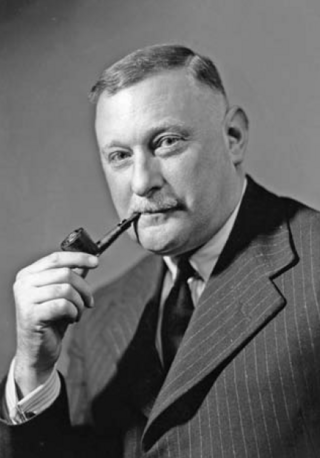
Cecil John Charles Street, better known as John Street, was a major in the British Army and a crime fiction novelist.
Man Overboard may refer to:

Sudden Death is a 1932 detective novel by the Irish writer Freeman Wills Crofts. It is the eighth in his series of novels featuring Inspector French, a prominent figure of the Golden Age of Detective Fiction.
Inspector Joseph French is a fictional British police detective created by Irish author Freeman Wills Crofts. French was a prominent detective from the Golden Age of Detective Fiction, appearing in twenty-nine novels and a number of short stories between 1924 and 1957. The character was introduced in the 1924 novel Inspector French's Greatest Case, where he investigates a fatal diamond robbery in Hatton Garden. The series relied largely on puzzle mysteries.

The Hog's Back Mystery (1933), also known as The Strange Case of Dr. Earle, is a "Golden Age" mystery novel by the Irish author Freeman Wills Crofts. It is the tenth novel in his Inspector French series. The novel is an early example of the police procedural subgenre of detective fiction. It was the first of Croft's books published by Hodder & Stoughton. It was reissued in 2015 by British Library Publishing.

Crime at Guildford is a 1935 detective novel by the writer Freeman Wills Crofts. Crofts was a leading figure of the Golden Age of Detective Fiction and often set his novels in Surrey where he lived close to Guildford. It was the thirteenth in a series of novels featuring Inspector French. It was published in America by Dodd Mead under the alternative title The Crime at Nornes.
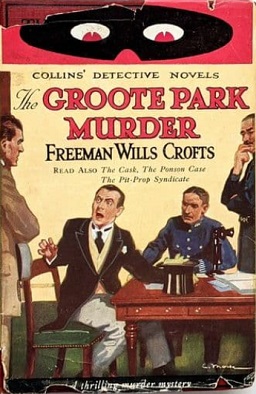
The Groote Park Murder is a 1923 detective novel by Freeman Wills Crofts, one of the leading figures of the Golden Age of Detective Fiction. It was one of several stand-alone novels Crofts wrote following his successful debut The Cask, before creating the character of Chief Inspector French who debuted the following year in Inspector French's Greatest Case.

The Pit-Prop Syndicate is a 1922 thriller novel by Freeman Wills Crofts, one of the leading figures of the Golden Age of Detective Fiction. It was one of several stand-alone novels Crofts wrote following his successful debut The Cask, before creating the character of Inspector French who debuted in Inspector French's Greatest Case (1924).

Sir John Magill’s Last Journey is a 1930 detective novel by the Irish writer Freeman Wills Crofts. It is the sixth in his series of novels featuring Inspector French, a prominent figure of the Golden Age of Detective Fiction. Much of the novel takes place in Northern Ireland, particularly around Belfast, where Crofts had spent a great deal of his younger years before moving to England. As with many of his puzzle mysteries its solution revolves around railway timetables as well as the possible distance a boat could cover in a certain time.

Antidote to Venom is a 1938 detective novel by the Irish-born novelist Freeman Wills Crofts. It is the eighteenth in his series of novels featuring Inspector French, a Scotland Yard detective known for his methodical technique. It was reissued in 2015 by the British Library Publishing as part of a group of crime novels from the Golden Age of Detective Fiction.

The End of Andrew Harrison is a 1938 detective novel by Freeman Wills Crofts. It is the seventeenth in his series of novels featuring Inspector French, a Scotland Yard detective of the Golden Age known for his methodical technique. The title character closely resembles Sigsbee Manderson, the murder victim of E.C. Bentley's celebrated 1913 novel Trent's Last Case.
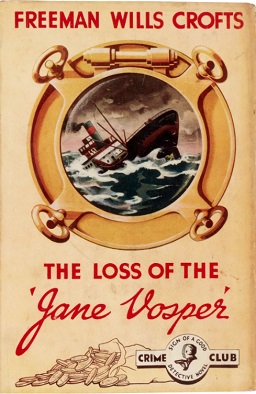
The Loss of the Jane Vosper is a 1936 detective novel by Freeman Wills Crofts. It is the fourteenth in his series of novels featuring Inspector French, a Scotland Yard detective of the Golden Age known for his thorough technique. It particularly dwells on the process of police procedure.

In Face of the Verdict is a 1936 detective novel by John Rhode, the pen name of the British writer Cecil Street. It is the twenty fourth in his long-running series of novels featuring Lancelot Priestley, a Golden Age armchair detective. Unusually in the series Priestley takes a more active role in the investigation himself, rather than solving it from a detached distance. It was not published in the United States until 1940, by Dodd Mead, with the slightly altered title of In the Face of the Verdict.

Death on the Way is a 1932 detective novel by the Irish writer Freeman Wills Crofts. It is the ninth in his series of novels featuring Inspector French, a prominent figure of the Golden Age of Detective Fiction. It was published in the United States the same year by Harper under the alternative title Double Death.
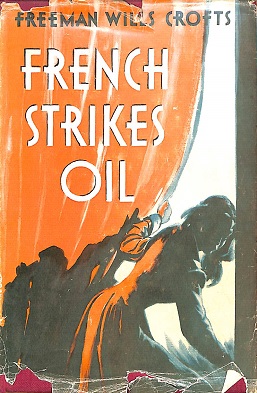
French Strikes Oil is a 1951 detective novel by the Irish-born writer Freeman Wills Crofts. It is the twenty eighth and penultimate entry in his series of novels featuring Inspector French, a Scotland Yard detective of the Golden Age known for his methodical technique. It was published in the United States by Dodd Mead under the alternative title of Dark Journey.

The Lake District Murder is a 1935 detective novel by the British writer John Bude. It is the first in a series of novels featuring Chief Inspector Meredith, promoted at the end of case to Superintendent. Set in the Lake District of Northern England, it shows the influence of Freeman Wills Crofts's Inspector French novels by featuring a detective who methodically breaks down the alibis of his suspects. In 2014 it was reissued by the British Library Publishing as part of a group of republished crime novels from the Golden Age of Detective Fiction.

James Tarrant, Adventurer is a 1941 detective novel by the Irish-born writer Freeman Wills Crofts. It is the twenty-first in his series of novels featuring Chief Inspector French of Scotland Yard, written during the Golden Age of Detective Fiction. Published in Britain by Hodder and Stoughton, it was released in America by Dodd Mead under the alternative title Circumstantial Evidence.
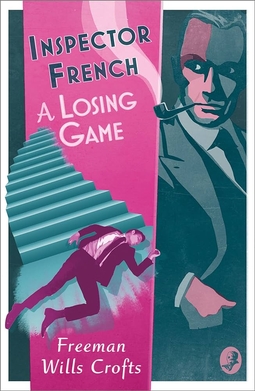
The Losing Game is a 1941 detective novel by the Anglo-Irish writer Freeman Wills Crofts. It is the twenty second in his series of novels featuring the Golden Age detective Inspector French of Scotland Yard. It was published in the United States by Dodd, Mead under the alternative title A Losing Game.
